This is a list of notable events in music that took place in the year 1930.

Sigmund Romberg was a Hungarian-born American composer. He is best known for his musicals and operettas, particularly The Student Prince (1924), The Desert Song (1926) and The New Moon (1928).

Jeanette Anna MacDonald was an American singer and actress best remembered for her musical films of the 1930s with Maurice Chevalier and Nelson Eddy. During the 1930s and 1940s she starred in 29 feature films, four nominated for Best Picture Oscars, and recorded extensively, earning three gold records. She later appeared in opera, concerts, radio, and television. MacDonald was one of the most influential sopranos of the 20th century, introducing opera to film-going audiences and inspiring a generation of singers.
An assassin is a person who commits targeted murder.
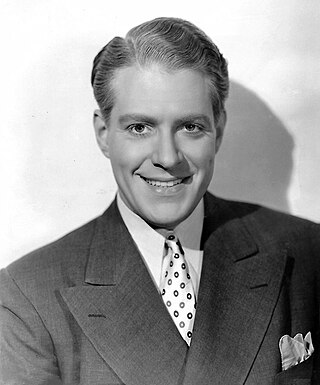
Nelson Ackerman Eddy was an American actor and baritone singer who appeared in 19 musical films during the 1930s and 1940s, as well as in opera and on the concert stage, radio, television, and in nightclubs. A classically trained baritone, he is best remembered for the eight films in which he costarred with soprano Jeanette MacDonald. He was one of the first "crossover" stars, a superstar appealing both to shrieking bobby soxers and opera purists, and in his heyday, he was the highest paid singer in the world.
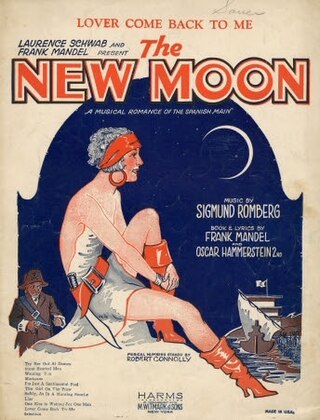
The New Moon is an operetta with music by Sigmund Romberg, lyrics by Oscar Hammerstein II and book by Oscar Hammerstein II, Frank Mandel, and Laurence Schwab. The show was the third in a string of Broadway hits for Romberg written in the style of Viennese operetta. Set in 1792, shortly before the French Revolution, the story centers on a young French aristocrat in disguise, who has fled his country and falls in love with the daughter of a prominent New Orleans planter.
Someone like You may refer to:
Sweethearts may refer to:

Little Mary Sunshine is a musical that parodies old-fashioned operettas and musicals. The book, music, and lyrics are by Rick Besoyan. The original Off-Broadway production premiered November 18, 1959 at the Orpheum Theatre in New York City's East Village. Staying in the neighborhood, it moved to the Player's Theatre on June 21, 1961, then, finally, to the Cherry Lane Theatre on March 21, 1962. Closing was Sept. 2, 1962. Combined run was 1,143 performances. It was seen briefly in a West End production in 1962 and has become a popular show for amateur and semi-professional groups in the United States and elsewhere.

Maytime is a 1937 American musical and romantic-drama film produced by MGM. It was directed by Robert Z. Leonard, and stars Jeanette MacDonald and Nelson Eddy. The screenplay was rewritten from the book for Sigmund Romberg's 1917 operetta Maytime by Rida Johnson Young, Romberg's librettist; however, only one musical number by Romberg was retained.
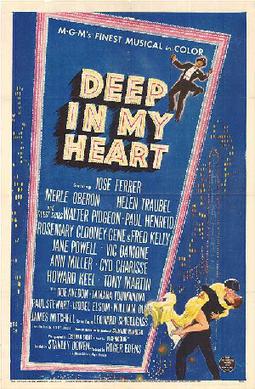
Deep in My Heart is a 1954 American MGM biographical musical film about the life of operetta composer Sigmund Romberg, who wrote the music for The Student Prince, The Desert Song, and The New Moon, among others. Leonard Spigelgass adapted the film from Elliott Arnold's 1949 biography of the same name. Roger Edens produced, Stanley Donen directed and Eugene Loring choreographed. José Ferrer played Romberg, with support from soprano Helen Traubel as a fictional character and Merle Oberon as actress, playwright, librettist, producer, and director Dorothy Donnelly.
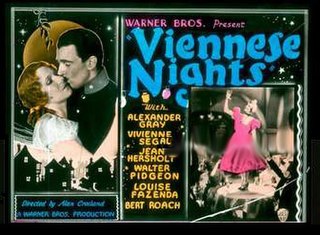
Viennese Nights is a 1930 American all-talking pre-Code musical operetta film directed by Alan Crosland and starring Alexander Gray, Vivienne Segal, Walter Pidgeon, Jean Hersholt, Bela Lugosi and Louise Fazenda. It was photographed entirely in Technicolor and released by Warner Brothers. Viennese Nights was the first original operetta written especially for the screen by Oscar Hammerstein II and Sigmund Romberg. It was filmed in March and April 1930, before anyone realized the extent of the economic hardships that would arrive with the Great Depression, which had begun in the autumn of the previous year. Although not a box office hit in the United States, the film had long box office runs in Britain and Australia. It is one of the earliest sound films to have a short pre-credit sequence.

Maytime is a musical with music by Sigmund Romberg and lyrics and book by Rida Johnson Young, and with additional lyrics by Cyrus Wood. The story is based on the 1913 German operetta Wie einst im Mai, composed by Walter Kollo, with words by Rudolf Bernauer and Rudolph Schanzer. The story, set in New York, is told in episodes covering a long period, from 1840 to the 20th century. Wealthy young Ottillie is in love with Dick, but they are kept apart by family and circumstance. Years later, their descendants marry. Maytime introduced songs such as "The Road to Paradise", "Will You Remember?" and "Jump Jim Crow".
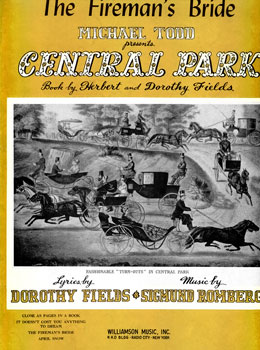
Up in Central Park is a Broadway musical with a book by Herbert Fields and Dorothy Fields, lyrics by Dorothy Fields, and music by Sigmund Romberg. The musical, originally called "Central Park" before Broadway, was Romberg's last stage work produced during his lifetime.

The Girl of the Golden West is a 1938 American musical Western film adapted from the 1905 play of the same name by David Belasco, better known for providing the plot of the opera La fanciulla del West by Giacomo Puccini. A frontier woman falls in love with an outlaw.

Singing Lovebirds is a 1939 Japanese musical comedy film directed by Masahiro Makino. Makino made the film in only two weeks while the production of another film, Yaji Kita Dōchūki, was put on hold after its star, Chiezō Kataoka, came down with appendicitis. The film, however, has become "the most frequently revived Japanese pre-war musical film," featuring music ranging from jazz to jōruri, and music stars like Dick Mine. Masahiro Makino produced other musicals, like Hanako-san (1943) and was known for his rhythmic style. Singing Lovebirds also features Takashi Shimura, most famous as the lead samurai in Akira Kurosawa's Seven Samurai, in a singing role.
Lover Come Back may refer to:

"Lovebird" is a song recorded by British singer-songwriter Leona Lewis for her third studio album Glassheart (2012). It was written by Bonnie McKee, Joshua "Ammo" Coleman and Lukasz "Dr. Luke" Gottwald, and produced by Josh Abrahams, Ammo and Oligee. "Lovebird" was recorded at Pulse Recording in Los Angeles and is a power ballad, incorporating a piano and synth-driven melody. The lyrics consist of Lewis informing her past lover that enough time has passed since their relationship for her to have moved on and to have developed as a person. Critics praised Lewis' vocal performance, likening her technical abilities to those of Mariah Carey and Whitney Houston. The musical structure of the song was heavily compared to one of her previous singles, "Bleeding Love", along with songs performed by Adele. The accompanying music video shows Lewis trying to escape from a giant bird cage.












